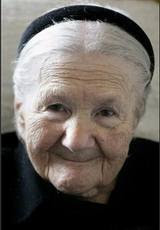 I believe that one of the most dangerous consequences of the current economic (and moral) crisis is this:
I believe that one of the most dangerous consequences of the current economic (and moral) crisis is this:Apathy, resignation and hopelessness.
The constant grind of negative news, combined with a sense of injustice and outrage, is provoking a handful of people to action, whilst numbing the vast majority of us.
From my own humble forum, I urge you to resist, to defy the mantra 'They' are feeding you that, quite simply, "Your Life Does Not Matter".
I urge you to consider the following story of the rich, meaningful life of Irena Sendler.
In doing so, I hope you, too, might discover how much of a difference you are capable of making. Start today!
* * * * *

"On 12 May 2008, Irena Sendlerowa (commonly known as
A Los Angeles Times obituary for Irena described how Irena, a Polish social worker, passed herself off as a nurse to sneak supplies and aid into (and children out of) the Warsaw Ghetto, and the punishment she endured when she was finally caught by the Nazis:
She studied at Warsaw University and was a social worker in Warsaw when the German occupation of Poland began in 1939. In 1940, after the Nazis herded Jews into the ghetto and built a wall separating it from the rest of the city, disease, especially typhoid, ran rampant. Social workers were not allowed inside the ghetto, but Sendler, imagining "the horror of life behind the walls," obtained fake identification and passed herself off as a nurse, allowed to bring in food, clothes and medicine.
By 1942, when the deadly intentions of the Nazis had become clear, Sendler joined a Polish underground organization, Zegota. She recruited 10 closefriends — a group that would eventually grow to 25, all but one of them women — and began rescuing Jewish children.
She and her friends smuggled the children out in boxes, suitcases, sacks and coffins, sedating babies to quiet their cries. Some were spirited away through a network of basements and secret passages. Operations were timed to the second. One of Sendler's children told of waiting by a gate in darkness as a German soldier patrolled nearby. When the soldier passed, the boy counted to 30, then made a mad dash to the middle of the street, where a manhole cover opened and he was taken down into the sewers and eventually to safety.
Most of the children who left with Sendler's group were taken into Roman Catholic convents, orphanages and homes and given non-Jewish aliases. Sendler recorded their true names on thin rolls of paper in the hope that she could reunite them with their families later. She preserved the precious scraps in jars and buried them in a friend's garden.
In 1943, she was captured by the Nazis and tortured but refused to tell her captors who herco-conspirators were or where the bottles were buried.
When the war ended, Sendler unearthed the jars and began trying to return the children to their families. For the vast majority, there was no family left. Many of the children were adopted by Polish families; others were sent to Israel."
* * * * *
By 1942, when the deadly intentions of the Nazis had become clear, Sendler joined a Polish underground organization, Zegota. She recruited 10 close
She and her friends smuggled the children out in boxes, suitcases, sacks and coffins, sedating babies to quiet their cries. Some were spirited away through a network of basements and secret passages. Operations were timed to the second. One of Sendler's children told of waiting by a gate in darkness as a German soldier patrolled nearby. When the soldier passed, the boy counted to 30, then made a mad dash to the middle of the street, where a manhole cover opened and he was taken down into the sewers and eventually to safety.
Most of the children who left with Sendler's group were taken into Roman Catholic convents, orphanages and homes and given non-Jewish aliases. Sendler recorded their true names on thin rolls of paper in the hope that she could reunite them with their families later. She preserved the precious scraps in jars and buried them in a friend's garden.
In 1943, she was captured by the Nazis and tortured but refused to tell her captors who her
When the war ended, Sendler unearthed the jars and began trying to return the children to their families. For the vast majority, there was no family left. Many of the children were adopted by Polish families; others were sent to Israel."
* * * * *
Grateful acknowledgement for this text is made to Snopes.com.
No hay comentarios:
Publicar un comentario